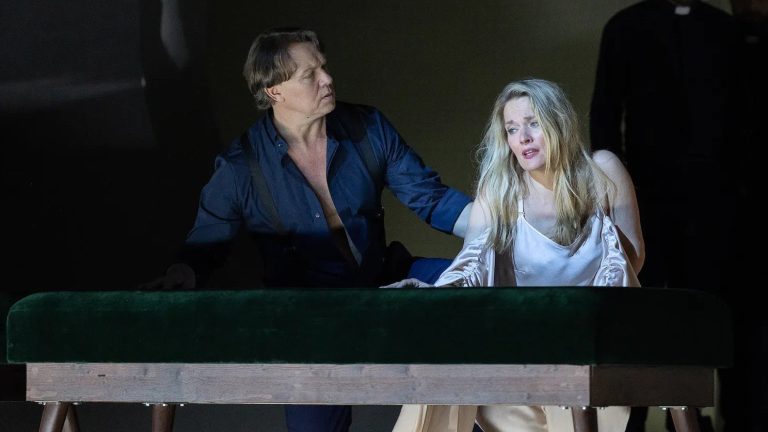Antonín Dvořák’s final work, the opera Armida, treating timeless themes, is returning to the National Theatre in Prague after three decades. Featuring stellar Czech and Slovak singers, the new production will premiere on 19 May within the Prague Spring festival. Directed by Jiří Heřman, it will be conducted by Robert Jindra.
The opera Armida is unique in several respects. Antonín Dvořák’s very last work, its music is characterised by his quintessential religious lyricism and extensive, highly dynamic, dramatic passages, while also manifesting the influence of Richard Wagner’s style, thus placing enormous requirements on the performers. The themes it centres on – the clash between Islam and Christianity, self-sacrifice and other moral dilemmas – remain topical today.
Following the resounding success of Rusalka in 1901, Antonín Dvořák aspired to create an opera that would have an international outreach and appeal to as wide a spectrum of listeners as possible. He ultimately decided to set a libretto by Jaroslav Vrchlický, based on an episode from Torquato Tasso’s epic poem La Gerusalemme liberata (Jerusalem Delivered). The story of the Saracen sorceress Armida, who falls in love with the Christian knight Rinaldo, has inspired numerous composers, including Monteverdi, Lully, Gluck and Rossini. Dvořák’s Armida received its world premiere at the National Theatre in Prague on 25 March 1904.
The music for our new production has been explored by Robert Jindra, Music Director of the National Theatre Opera, who will conduct the National Theatre Orchestra and the National Theatre Chorus, led by Lukáš Kozubík. Jindra had described the score as abounding in a variety of musical expression: “A piece clearly bearing Dvořák’s hallmark, immensely dramatic and featuring leitmotifs in the fashion of Wagner’s style, it also contains new harmonies, which seem to presage Impressionism. Owing to its being extremely large-scale and challenging in all aspects, the opera is exceptional and surpassing the common repertoire. I believe that due to Jiří Heřman’s novel, inspiring approach, the new adaptation of Armida, a magnificent work returning to the National Theatre more than three decades after the previous production, will reach out to a contemporary audience.”
Robert Jindra personally invited the renowned Czech director Jiří Heřman to stage Armida. Currently serving as Artistic Director of the Janáček Opera of the National Theatre in Brno, Heřman likes to return to Prague, where he has created an acclaimed production of Rusalka, Antonín’s Dvořák’s most celebrated opera, as well as adaptations of Zdeněk Fibich’s The Fall of Arkun and Giacomo Puccini’s Madama Butterfly. He wanted to present a new view of Armida: “I was happy to accept the offer, with my only condition being making minor modifications to Jaroslav Vrchlický’s libretto. The dramaturge Patricie Částková and I have amended the text, reflecting contemporary parlance and aiming to make it comprehensible to today’s listeners. I deem the subject intriguing due to its encompassing multiple layers, focusing on the theme of religion that, instead of uniting, divides people, as well as the theme of self-sacrifice. The protagonists are compelled to choose one of the warring parties, which leads to a tragic ending. Overall, I would like to put across Armida as a ‘fairy tale for adults’, conveying a moral message.” The production’s appeal is enhanced by gracious scenery, designed by Dragan Stojčevski, who has previously collaborated with Jiří Heřman on many other opera projects, as has Zuzana Rusínová, who has created the costumes.
“Dvořák’s Armida is an opera of Wagnerian dimensions,” said Per Boye Hansen, Artistic Director of the National Theatre Opera and the State Opera. “I was astonished by the fullness and power of its music when Robert Jindra first presented it to me. Primarily known worldwide for Rusalka, after the almost five years I have worked in Prague, during which I have heard several of his operas, Dvořák has become one of my favourite composers. I eagerly await and look forward to the premiere of the production directed by Jiří Heřman.”
Jan Burian, General Director of the National Theatre, pointed out: “The production is a National Theatre contribution to the celebrations of the forthcoming Year of Czech Music.”
The challenging vocal parts have been assigned to some of the most distinguished Czech and Slovak singers. The role of Armida will be performed by Alžběta Poláčková, the Christian knight Rinald will be portrayed by Aleš Briscein, Ismen by Svatopluk Sem, King Hydraot by František Zahradníček, the Christian commander Bohumír by Martin Bárta, Peter the Hermit by Štefan Kocán, the knight Sven by Martin Šrejma, the knight Ubald by Jan Šťáva, the Muezzin by Radek Martinec and the Siren by Doubravka Součková. ”Armida is an intrepid young woman, a fighter listening to her heart, determined to do anything for love,” said Alžběta Poláčková, cast in the title role, adding: “Armida’s passion and resolve are perfectly underlined by Dvořák’s score, its abundant melodiousness and musical imagination – by and large, sheer beauty. The role is grand and difficult indeed. The singer must carefully distribute her powers – vocal and physical, as well as mental.”











